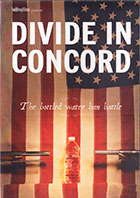
Divide in Concord 2014
Distributed by Bullfrog Films, PO Box 149, Oley, PA 19547; 800-543-FROG (3764)
Produced by David Regos & Jaedra Luke
Directed by Kris Kaczor
DVD, color, 82 min. (theatrical version); 60 min. (classroom version)
Middle School - General Adult
Activism, Environmentalism, Protest Movements, Sustainable Living, History, Water
Date Entered: 08/19/2015
Reviewed by Kathleen Spring, Nicholson Library, Linfield College, McMinnville, ORIn many ways, filmmaker Kris Kaczor’s documentary Divide in Concord can be considered a modern-day David and Goliath story. In 2007, eighty-four year-old Jean Hill began her crusade to ban the sale of single-serving plastic water bottles in Concord, Massachusetts. Hill, who was coming out of mourning after the death of her husband a year earlier, was inspired by her grandson to make a difference locally after learning about the Great Pacific Garbage Patch. In 2011, using the local legislative process known as a Town Meeting, Hill introduced a motion to ban sales of plastic water bottles; it failed to pass by 7 votes. Divide in Concord chronicles Hill’s 2012 follow-up effort.
The film is both inspiring and frustrating to watch. For all her enthusiasm about the issue, Hill is not always articulate in defending her cause, and it can be painful to see her struggle to get her arguments across in one-on-one meetings or in radio interviews. Although we never hear from Kaczor directly, subtle editing choices make it clear where his sympathies lie. Nevertheless, Kaczor tries to represent all sides of the debate, giving significant screen time to residents opposed to Hill’s motion. For this reason, Divide in Concord is an excellent choice to spur classroom discussion of the tensions that arise when environmental issues, civil liberties, and corporate interests converge. The film is appropriate for use in secondary schools, as well as for undergraduate courses in environmental studies, political science, or sociology; it could be paired with a number of other films (such as Flow: For Love of Water (2008), Tapped (2010), or Liquid Assets: The Big Business of Water (2010)) to provide additional context for the issues at play. Divide in Concord would also be a welcome addition for public library collections, particularly in Massachusetts or in communities contemplating similar proposals.